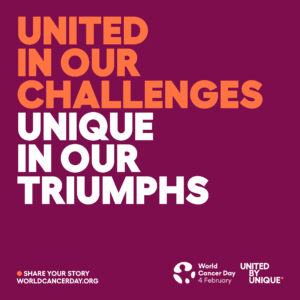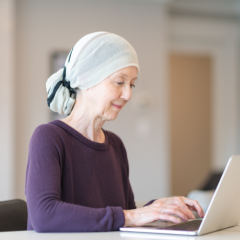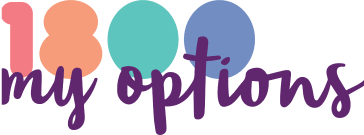Oesophageal cancer: symptoms, reduce risk, and support options
Oesophageal cancer, while not as widely discussed as some other types of cancer, is a serious health condition that affects many Australians each year. Understanding the symptoms, risk factors, and treatments available can make a world of difference in early detection and improving outcomes. The 5-year survival rate for oesophageal cancer, though significantly lower than many other cancers, has improved in recent years, rising from 12% in 1982-1986 to 25% in 2017-2021. (Cancer Council Australia, June 2024)
What is oesophageal cancer?
The oesophagus is the tube that carries food and liquids from your mouth to your stomach. Oesophageal cancer develops when abnormal cells grow uncontrollably in the lining of the oesophagus. These cells can form a tumour that can interfere with swallowing and, in more severe cases, spread to other parts of the body.
There are two main types of oesophageal cancer:
- Adenocarcinoma: This is the most common type in Western countries, including Australia. It usually starts in the lower part of the oesophagus near the stomach and is often linked to acid reflux or gastroesophageal reflux disease (GERD).
- Squamous cell carcinoma: This type typically starts in the upper and middle part of the oesophagus and is more common in countries with high rates of tobacco and alcohol consumption.
Prevention: how can you reduce the risk?
There are some risk factors for oesophageal cancer which can be modified.
- Maintain a healthy weight
- Quit smoking and limit alcohol intake
- Manage acid reflux
- Eat a healthy diet
Taking these steps may not prevent you developing cancer, and some people with multiple risk factors may not ever develop oesophageal cancer. Cancer Australia has more information about risk factors for oesophageal cancer (Cancer Australia, September 2024).
What symptoms should you watch for?
Oesophageal cancer can develop slowly, and the early stages often do not cause noticeable symptoms. However, as the cancer progresses, you may begin to notice the following signs:
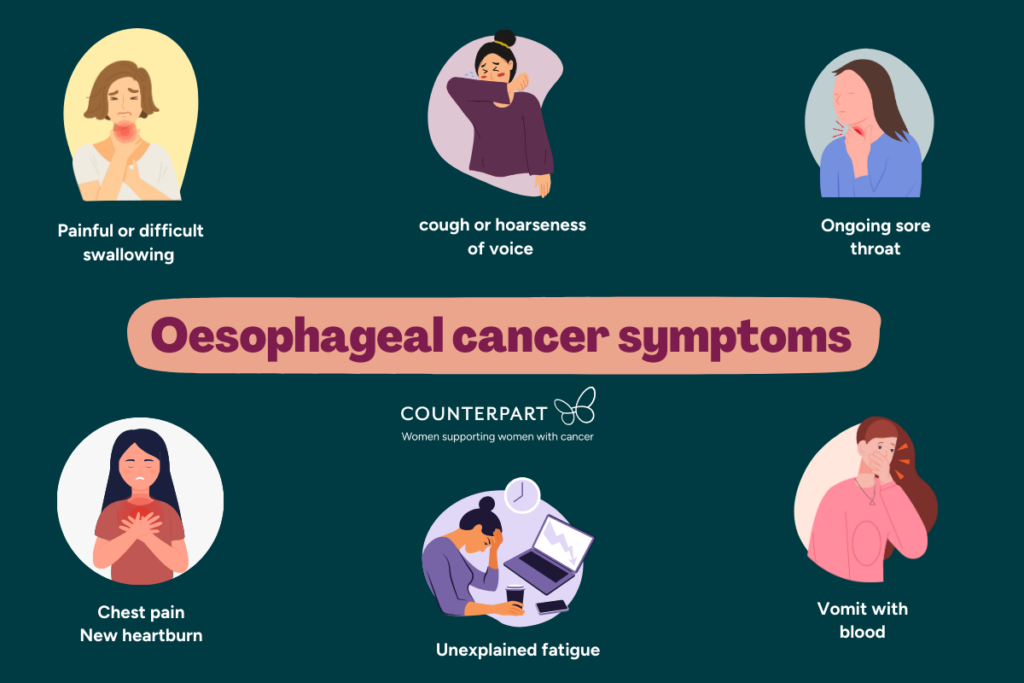
If you experience any of these symptoms, it’s essential to consult a healthcare professional as soon as possible. Early detection is key to improving the chances of successful treatment. (Cancer Council Australia, February 2025)
Where can you get get support if you are diagnosed?
Pancare Foundation – provides in-depth information on various aspects of oesophageal cancer from symptoms, diagnosis and beyond. They also offer supportive resources and practical guidance to help patients and their loved ones navigate the challenges associated with this type of cancer. Pancare offer support with specialist nurses and the PanSupport Helpline. Their patient handbook is a helpful resource.
GI Cancer Institute – Information, resources, support group directory, and links, including details on current clinical trials.
Counterpart Peer Support Volunteers – Talk to a woman who has experienced cancer and is trained to support others experiencing cancer.
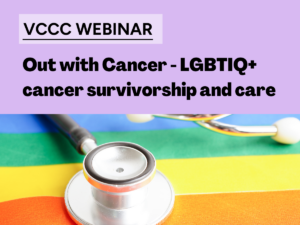 This online event, presented by Dr Rosalie Power, will explore the unique challenges faced by LGBTIQ+ individuals in cancer care. The findings, based on the Out with Cancer study, are drawn from surveys of 430 LGBTIQ+ cancer patients, 131 informal carers and 357 healthcare professionals.
This online event, presented by Dr Rosalie Power, will explore the unique challenges faced by LGBTIQ+ individuals in cancer care. The findings, based on the Out with Cancer study, are drawn from surveys of 430 LGBTIQ+ cancer patients, 131 informal carers and 357 healthcare professionals.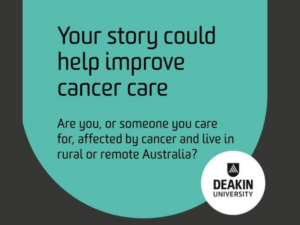 If you or someone you care for has experienced cancer treatment in rural or remote Australia, Deakin University and Equitable Cancer Outcomes across Rural and Remote Australia (ECORRA) would appreciate hearing your story. With a genuine rural and remote focus, ECORRA is one of Australia’s leading research groups dedicated to reducing geographical inequities in all areas of cancer care. Taking part in this study would help in their aim at improving cancer care in rural and remote health services.
If you or someone you care for has experienced cancer treatment in rural or remote Australia, Deakin University and Equitable Cancer Outcomes across Rural and Remote Australia (ECORRA) would appreciate hearing your story. With a genuine rural and remote focus, ECORRA is one of Australia’s leading research groups dedicated to reducing geographical inequities in all areas of cancer care. Taking part in this study would help in their aim at improving cancer care in rural and remote health services.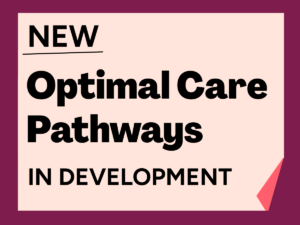 Cancer Australia is pleased to announce the development of two new
Cancer Australia is pleased to announce the development of two new 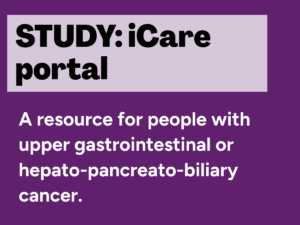 iCare is a new interactive web-based portal to improve symptom management and wellbeing for people diagnosed with upper gastrointestinal or hepato-pancreato-biliary cancers and their carers. This personalised program offers a comprehensive selection of interactive modules and provides information and access to resources needed during a cancer diagnosis. Currently seeking input from those who would use the platform, the iCare portal is being trialed among people living with upper gastrointestinal or hepato-pancreato-biliary cancer.
iCare is a new interactive web-based portal to improve symptom management and wellbeing for people diagnosed with upper gastrointestinal or hepato-pancreato-biliary cancers and their carers. This personalised program offers a comprehensive selection of interactive modules and provides information and access to resources needed during a cancer diagnosis. Currently seeking input from those who would use the platform, the iCare portal is being trialed among people living with upper gastrointestinal or hepato-pancreato-biliary cancer.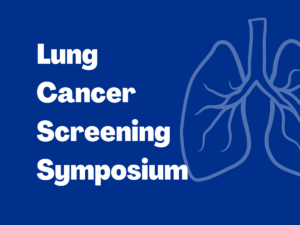
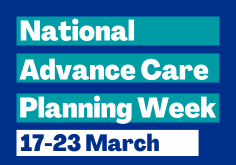 Advance care planning involves making decisions about your future health care in case you become seriously ill and unable to communicate. It ensures that your loved ones and health care providers understand and respect your treatment preferences. Creating a documented plan improves ongoing and end-of-life care, ensures you receive the care you want, and reduces stress and anxiety for both you and your loved ones, especially during the difficult circumstances of being extremely unwell.
Advance care planning involves making decisions about your future health care in case you become seriously ill and unable to communicate. It ensures that your loved ones and health care providers understand and respect your treatment preferences. Creating a documented plan improves ongoing and end-of-life care, ensures you receive the care you want, and reduces stress and anxiety for both you and your loved ones, especially during the difficult circumstances of being extremely unwell.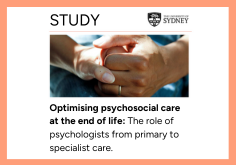
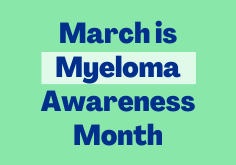
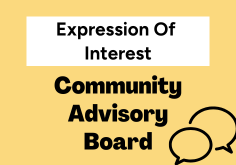 The Doherty Institute is currently seeking a community member to join their Community Advisory Board (CAB). The CAB plays a crucial role in supporting the Institute’s work by providing a voice for individuals who have been affected by or are at increased risk of infectious diseases, immune-related disorders, or illnesses where immunotherapy is vital, such as cancer.
The Doherty Institute is currently seeking a community member to join their Community Advisory Board (CAB). The CAB plays a crucial role in supporting the Institute’s work by providing a voice for individuals who have been affected by or are at increased risk of infectious diseases, immune-related disorders, or illnesses where immunotherapy is vital, such as cancer.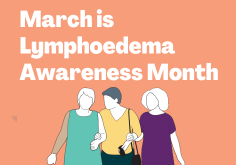
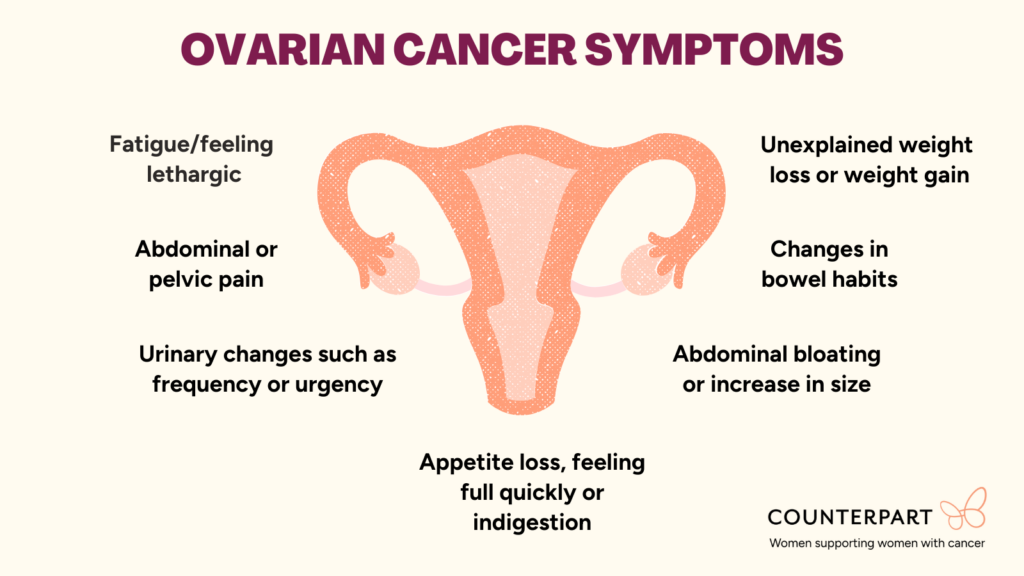
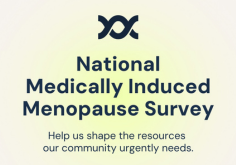 Inherited Cancers, in partnership with Jean Hailes for Women’s Health, is launching the National Medically Induced Menopause Survey to help create the vital resources the community urgently needs. Medically induced menopause impacts many individuals managing ovarian cancer risk, yet accessing clear, relevant, Australia-specific information remains a challenge.
Inherited Cancers, in partnership with Jean Hailes for Women’s Health, is launching the National Medically Induced Menopause Survey to help create the vital resources the community urgently needs. Medically induced menopause impacts many individuals managing ovarian cancer risk, yet accessing clear, relevant, Australia-specific information remains a challenge.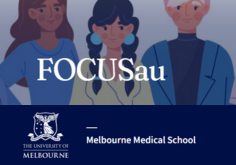 The FOCUSau study, lead by Melbourne University is recruiting individuals living with advanced cancer and their family carers to evaluate a three-month online support program designed to enhance their wellbeing and quality of life. Participants will work through four guided sessions together over three months. The study will compare those who complete the program with those who do not, with participation in the program being randomly assigned. Both groups will continue receiving usual care from their healthcare team. Participants will complete surveys at the start and end of the study to assess whether the FOCUSau program leads to improvements in wellbeing and quality of life.
The FOCUSau study, lead by Melbourne University is recruiting individuals living with advanced cancer and their family carers to evaluate a three-month online support program designed to enhance their wellbeing and quality of life. Participants will work through four guided sessions together over three months. The study will compare those who complete the program with those who do not, with participation in the program being randomly assigned. Both groups will continue receiving usual care from their healthcare team. Participants will complete surveys at the start and end of the study to assess whether the FOCUSau program leads to improvements in wellbeing and quality of life. Western Sydney University (WSU) is looking for participants for a study on how Indian Australian cancer patients cope with their diagnosis. By completing an online survey, you’ll answer questions about your background, how you manage stress, and how effective these strategies are. At the end of the survey, you can choose to participate in an interview. The findings from this study will help researchers better understand how Indian Australians cope with cancer, which could lead to improvements in healthcare for those facing cancer in this community.
Western Sydney University (WSU) is looking for participants for a study on how Indian Australian cancer patients cope with their diagnosis. By completing an online survey, you’ll answer questions about your background, how you manage stress, and how effective these strategies are. At the end of the survey, you can choose to participate in an interview. The findings from this study will help researchers better understand how Indian Australians cope with cancer, which could lead to improvements in healthcare for those facing cancer in this community.
 This pre-conference workshop, co-hosted by Breast Cancer Network Australia (BCNA) and the Clinical Oncology Society of Australia (COSA), offers participants the opportunity to enhance their understanding of consumer engagement in cancer care. Through interactive sessions, attendees will learn about the fundamentals of consumer engagement, including its role in health policy, research, and strategy. Participants will gain practical skills in meaningful engagement, from recruitment and ethical considerations to co-design practices. The workshop will also cover how to measure impact and sustain long-term engagement in cancer care.
This pre-conference workshop, co-hosted by Breast Cancer Network Australia (BCNA) and the Clinical Oncology Society of Australia (COSA), offers participants the opportunity to enhance their understanding of consumer engagement in cancer care. Through interactive sessions, attendees will learn about the fundamentals of consumer engagement, including its role in health policy, research, and strategy. Participants will gain practical skills in meaningful engagement, from recruitment and ethical considerations to co-design practices. The workshop will also cover how to measure impact and sustain long-term engagement in cancer care.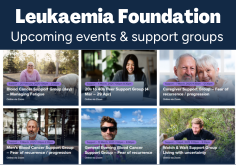 The Leukaemia Foundation offers several ways for you to connect with others, learn more about blood cancer, and hear from healthcare professionals. Their online support groups, education webinars, and private Facebook groups are moderated by Leukaemia Foundation staff and are open to anyone living with blood cancer, as well as their family and friends, across Australia. No matter where you live, your age, or the stage of blood cancer, you’re welcome to join. These webinars, seminars, and support groups are easy to access via Zoom – all you need is a device such as a smartphone, computer, or laptop and an internet connection.
The Leukaemia Foundation offers several ways for you to connect with others, learn more about blood cancer, and hear from healthcare professionals. Their online support groups, education webinars, and private Facebook groups are moderated by Leukaemia Foundation staff and are open to anyone living with blood cancer, as well as their family and friends, across Australia. No matter where you live, your age, or the stage of blood cancer, you’re welcome to join. These webinars, seminars, and support groups are easy to access via Zoom – all you need is a device such as a smartphone, computer, or laptop and an internet connection.